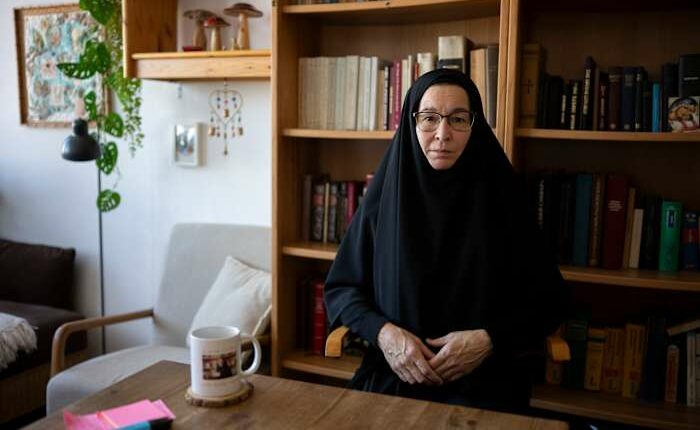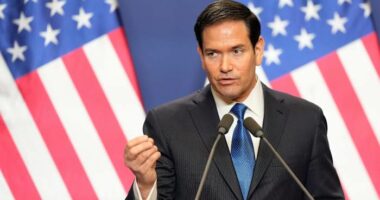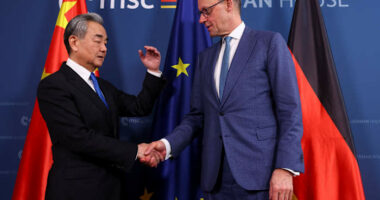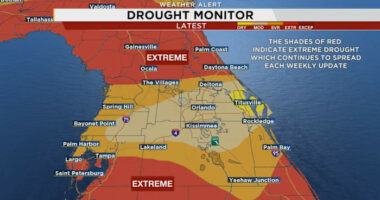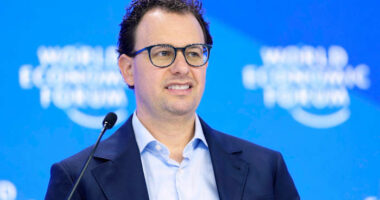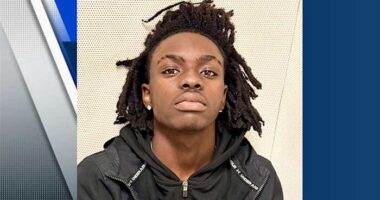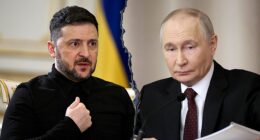Share this @internewscast.com
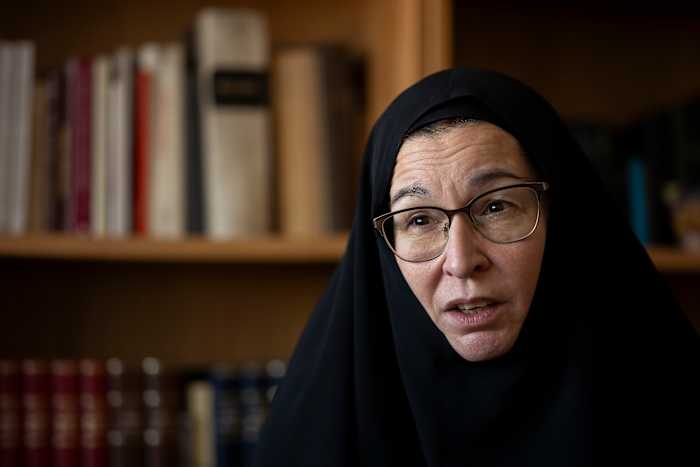
Prior to 2022, Sister Vassa Larin gained recognition as an Orthodox nun who educated countless viewers on YouTube about saints and religious holidays. She emerged as a leading female intellectual in Orthodoxy, earning widespread respect within a religious community known for its male-dominated clergy and leadership.
Then Russia invaded Ukraine.
Larin publicly opposed it.
Eventually her bishop revoked her status as a nun.
Sister Larin revealed that an effort to silence her was made by ordering her to halt her media activities. When she protested, she was stripped of her status as a nun. This decision was formalized in May by the Synod of Bishops of the Russian Orthodox Church Outside of Russia (ROCOR), a branch of Eastern Orthodoxy.
The official reason the bishops gave was “disobedience” — with no specifics.
Larin firmly believes the root cause was her vocal criticism of Moscow Patriarch Kirill, who has supported Russia’s military endeavors, along with others backing him. Kirill holds overarching authority over the New York-based ROCOR.
Compelled to speak out
Larin and her advocates state that this incident marks the first known occurrence of the Moscow church targeting an American Orthodox individual who challenges its pro-war perspective. A study by Fordham University highlights that numerous Orthodox priests expressing dissent within Russia have already faced penalties.
“I could not not say these things,” Larin, 54, said in a Zoom interview from Vienna, where she lives.
“Patriarch Kirill twists religious language and spiritual ideas to serve political ends,” she remarked. “It is profoundly cynical and amounts to blasphemy. … However, the true tragedy lies in the loss of lives resulting from these actions.”
ROCOR officials did not reply to multiple requests for comment made via email and telephone over two weeks.
Larin maintains the ROCOR ruling removing her from the monastic state is illegal under church law.
Although she still dons her traditional black veil and cloak, Larin has aligned with a different religious jurisdiction — the Kyiv-based Orthodox Church of Ukraine. She now serves as a visiting professor at the Kyiv Orthodox Theological Academy.
Her new supervising bishop, Metropolitan Yevstratiy Zoria, said by email that he appreciates Larin’s “devotion to peacemaking and condemning of Russian warmongering propaganda.”
Eastern Orthodoxy, the world’s second-largest Christian communion, is the majority religion in Russia and Ukraine. It is united by common creeds, sacraments and a belief that its bishops are direct successors to Jesus’ apostles.
But Orthodoxy has multiple jurisdictions, and the war has aggravated divisions.
A Russian emigre church, now loyal to Moscow
Russian President Vladimir Putin often surrounds himself with Orthodox iconography and defends the war in part by citing historic grievances of the Russian Orthodox Church.
Kirill has required his priests to pray for Russian victory. He pronounced that Russia’s war dead have their sins forgiven. He presided over a council calling the invasion of Ukraine a holy war against a “West that has fallen into Satanism.”
ROCOR was founded by Russian refugees fleeing Communist persecution in the early 20th century, including Larin’s own family.
ROCOR operated on its own during Communist times, believing that Moscow’s Orthodox leadership was compromised by Soviet control. But in 2007, ROCOR reconciled with the Russian Orthodox Church, maintaining some autonomy while submitting to the Moscow patriarch’s ultimate authority.
A search of ROCOR’s website for statements about Ukraine yields multiple calls for peace in general, without condemning Russia. But ROCOR bishops have regularly denounced Ukraine for moving to ban the Ukrainian Orthodox Church for allegedly failing to sever ties to Moscow.
In Russia, at least 79 Orthodox Christians have faced church sanction or other persecution for opposing the war, according to a Fordham University study published in May by its Orthodox Christian Studies Center. Sergei Chapnin, communications director for the center and author of the report, said the Moscow church has also placed behind-the-scenes pressure on U.S. Orthodox churches.
Larin said her ouster shows Moscow’s reach.
“This is not in Russia,” Larin said of ROCOR. “They’re under no obligation in front of any state authority, and they’re supposedly in the free world. But it’s the first case that we have of actual church-sponsored cracking down on an American citizen.”
More controversy in U.S. Orthodoxy
ROCOR isn’t the only American branch of Orthodoxy roiled by fallout from the Russian invasion. So has the Orthodox Church in America — a self-governing jurisdiction that also traces its roots to Russia.
Alaska Archbishop Alexei of the OCA exchanged warm greetings and gifts with Putin in Anchorage after Putin’s summit with U.S. President Donald Trump in August.
Ukrainian-American Orthodox bishops denounced this as a “betrayal of Christian witness.” Alexei apologized for causing anyone pain, though not for the meeting itself. His superior said the meeting didn’t reflect the OCA’s stance.
Putin is accused of war crimes by the International Criminal Court.
The Rev. Cyril Hovorun, a Ukraine native and critic of the Russian invasion, said the Alaska controversy and Larin’s ouster have common threads.
“It clearly indicates that the Russian Church tries to enhance its ties with the churches that either were connected with Moscow or continue to be connected with Moscow,” said Hovorun, a professor at the University College Stockholm.
Hovorun himself was defrocked by Kirill in 2024 and is now a priest under the Ecumenical Patriarch of Constantinople.
Hovorun admires Larin’s stance.
“I believe the ROCOR just got rid of the only prophetic voice it had,” he said.
A priest’s daughter and a YouTube personality
Larin found that voice growing up in Nyack, New York, where her father was a ROCOR priest and her family displayed a portrait of the last czar in the home. She attended public school but spoke Russian at home.
“We kept to our bubble,” she said. “We really were encouraged by our parents just to have friendships and go to summer camp with Russian Orthodox friends.”
As a teen during the 1980s Cold War thaw, she sent books and letters to believers in Russia and made the first of many visits there, encouraging the revival of Orthodoxy.
She walked away from a full scholarship at a prestigious U.S. college to become a nun, she said. Larin lived in a convent in France until her bishop assigned her to study Orthodox theology in Germany, where she earned a doctorate.
Larin moved to Austria, where she was a professor of liturgical studies at the Catholic Theological Faculty of the University of Vienna. She also served on Russian Orthodox Church commissions.
She now focuses on her media ministry, called “ Coffee with Sister Vassa.” Her YouTube channel, with about 24,000 subscribers, mostly features short educational videos on Orthodoxy, leavened with light humor.
She has had tensions with the ROCOR bishops before. In 2017, the synod spoke against Larin advising a mother to be relatively tolerant toward her gay son coming out. But the bishops didn’t challenge her nun status.
Beginning in 2022, Larin’s videos took a more serious tone as she denounced the church leaders who blessed the Russian invasion of Ukraine or kept silent.
She said the backlash began late last year, when she was placed under a new supervisor, Bishop Luke Murianka, based in upstate New York.
He emailed in January, telling her it “is spiritually harmful for you to live in the world and be occupied with your present social activities,” according to correspondence she shared publicly. He told her to cease the video work and other “social networking” and to join a convent — which would have silenced her public voice.
In reply, Larin questioned how he could assess her spiritual condition when they hadn’t spoken.
The bishop repeated the order to join a convent. After she didn’t, the Synod of Bishops confirmed the bishop’s decision to remove her from the monastic state.
The bishops’ action is “not a matter of this somehow hurting my feelings,” she said. “They do not have the power to redefine good and evil and to call black, white, and white, black.”
___
Associated Press religion coverage receives support through the AP’s collaboration with The Conversation US, with funding from Lilly Endowment Inc. The AP is solely responsible for this content.
Copyright 2025 The Associated Press. All rights reserved. This material may not be published, broadcast, rewritten or redistributed without permission.
